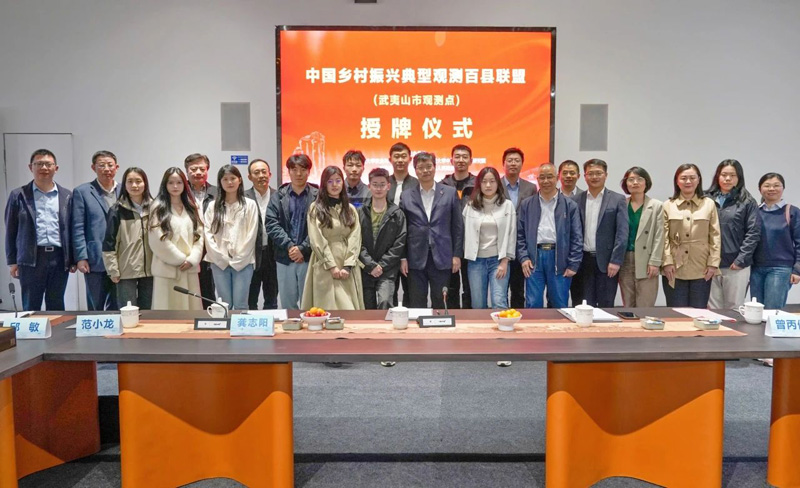
President Lin Shangli Visits Students on Research Trip in Fujian
From March 20 to 23, coinciding with the third anniversary of President Xi Jinping’s visit to Fujian, 17 faculty and students from the School of Agricultural Economics and Rural Development at Renmin University of China followed in his footsteps. They traveled to Wuyishan City, Nanping, Fujian, to conduct a practical research activity themed “Coordinated Development of the ‘Three Teas’” under the “Excellence in Agriculture and Rural Affairs Pioneers” initiative.
On the afternoon of March 22, Renmin University President Lin Shangli attended the “Excellence in Agriculture and Rural Affairs · Pioneers” - “Three Teas” Coordinated Development Symposium and the awarding ceremony for the “Alliance of 100 Counties for Observing Typical Rural Revitalization in China (Wuyishan Observation Point).” He also visited the faculty and students from the School of Agricultural Economics and Rural Development who were conducting practical research in Wuyishan City, Nanping. The meeting was attended by Gong Zhiyang, Deputy Mayor of Nanping, Fan Xiaolong, Deputy Director of Nanping Agricultural and Rural Affairs Bureau, Qiu Min, Deputy Mayor of Wuyishan City, Qiu Huanguang, Dean of the School of Agricultural Economics and Rural Development, Party Committee Deputy Secretary Lü Yuanyuan, Professors Kong Xiangzhi and Ke Shuifa, among others. Zeng Bingjian, Party Secretary of the School of Agricultural Economics and Rural Development, presided over the meeting.

On behalf of Renmin University, Lin Shangli expressed gratitude to Wuyishan City for providing valuable opportunities and excellent conditions for faculty and students to conduct practical research. He emphasized that during his 2021 visit to Fujian, President Xi Jinping stressed the need to “coordinate the major article on tea culture, tea industry, and tea technology.” Tea enterprises should seize strategic opportunities in rural revitalization, leveraging ecology, technology, culture, and management to create a new, globally competitive modern tea industry. Lin Shangli stated that faculty and students from the School of Agricultural Economics and Rural Development must thoroughly study and implement President Xi’s important discourses on agriculture, rural areas, and farmers, translating learning outcomes into practical actions to help answer the question, “How can Chinese tea truly go global?”
At the symposium, Jiang Zhidong from Fujian Zhengshantang Tea Co., Ltd., Yang Wenchun from Wuyishan Chief Rock Tea Factory, and Zhan Yonglu, a tea farmer from Huangcun Village, Xingcun Town, shared their extensive experience in tea cultivation and sales. Professors Kong Xiangzhi, doctoral student representative Li Yuan, master’s student representative Wan Shenwei, and undergraduate student representative Guan Xiaochuan discussed their insights and experiences from the practical activities in Wuyishan.
Following this, the awarding ceremony for the “Alliance of 100 Counties for Observing Typical Rural Revitalization in China (Wuyishan Observation Point)” was held. Qiu Huanguang represented the School of Agricultural Economics and Rural Development in presenting the plaque, and Qiu Min received it on behalf of Wuyishan City. Both parties expressed their intention to engage in regular, in-depth cooperation in areas such as talent cultivation, local development, and rural revitalization by leveraging their respective strengths.
This event was jointly organized by the School of Agricultural Economics and Rural Development at Renmin University of China, the China Rural Revitalization Research Institute of Renmin University, the Nanping Agricultural and Rural Affairs Bureau, and the Wuyishan City People’s Government. Representatives from Wuyishan’s tea enterprises, tea farmers, tea cooperatives, and faculty and student representatives from the School of Agricultural Economics and Rural Development participated in the event.

